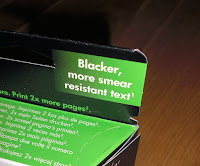More Smear, Seven Foot Doctors and Yes, Sometimes Punctuation IS Important
 Over the years I have taught hundreds of managers how to communicate effectively. One point I often make is that you should be focusing more on the goals and messages, and not just obsessing over minute rules of grammar, spelling and punctuation. But these can sometimes be very important too, as we will see.
Over the years I have taught hundreds of managers how to communicate effectively. One point I often make is that you should be focusing more on the goals and messages, and not just obsessing over minute rules of grammar, spelling and punctuation. But these can sometimes be very important too, as we will see.Yesterday I picked up a new ink cartridge for a printer and I was mildly surprised to see the package promising “more smear”. Looking again I realized that it really said “More smear resistant”. The reason my brain was fooled into not reading the second half of the adjective is that the hyphen was missing. If I had seen “more smear-“ my mind would have delayed interpreting the phrase until I had read the next word.
This is just one example where sloppy punctuation can change the meaning of a sentence or at least makes it ambiguous. Another classic of this type is the alleged newspaper headline “Hospital Sued by Seven Foot Doctors”, which is actually just a joke. Not only were the doctors not that tall; they also never existed.
There are actually many rules to tell you where to put the hyphen, and you can find plenty in the Wikipedia article at http://en.wikipedia.org/wiki/English_compound. But in practice rules vary and the only rule you really need to follow is that the meaning should be clear. When two adjectives are together you sometimes need to make it clear if they are each acting independently on some noun – as in “healthy white dog” – or if they together form a single idea, like “smear-resistant”. The simple litmus test is to ask yourself if you could split it into two phrases that both make sense. So “healthy dog” and “white dog” both work, while “smear ink” and “resistant ink” do not.
Getting back to the ink cartridge, I see three simple solutions to this problem: either add a small hyphen after “smear”, set the text so that “smear-resistant” is on the same line or just reword the text so that it says “Blacker Ink / Less Smearing”, which is not only less ambiguous it also takes up less space.


Comments